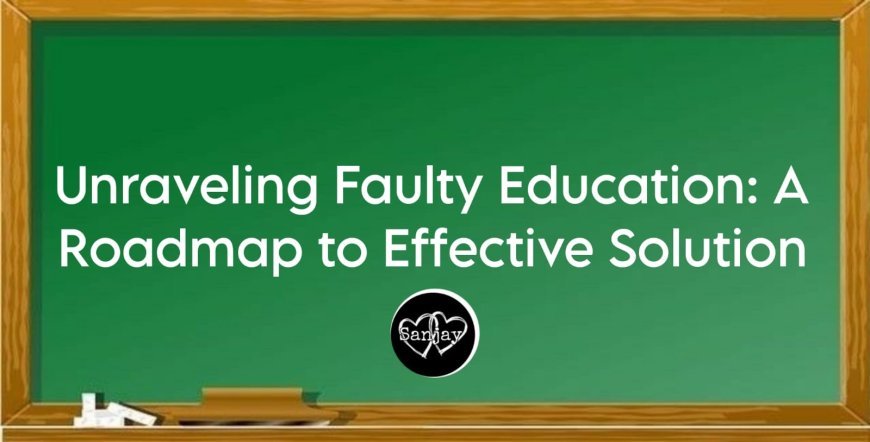Unraveling Faulty Education: A Roadmap to Effective Solutions

To address the deficiency in practical skills among students, a shift towards experiential learning is imperative. Integrating more hands-on activities, real-world projects, and internships into the curriculum can provide students with tangible skills that go beyond theoretical knowledge. Emphasizing problem-solving, critical thinking, and creativity should become central pillars of education.
Additionally, fostering collaboration between educational institutions and industries can bridge the gap between academia and the workforce. Establishing partnerships that facilitate internships, workshops, and mentorship programs allows students to apply classroom concepts in practical settings. This not only enhances their skill set but also provides insights into industry expectations.
Reforming assessment methods to include practical evaluations and project-based assessments can better gauge a student's proficiency. Rather than relying solely on exams, a comprehensive evaluation system should encompass a diverse range of skills, promoting a more holistic approach to education.
Investing in technology and vocational training is another avenue to equip students with relevant skills. Integrating courses that align with emerging technologies and industry demands ensures that graduates enter the job market with practical expertise. Vocational training programs can cater to a spectrum of skills, preparing students for diverse career paths.
Moreover, nurturing an entrepreneurial mindset from early education can instill resilience, adaptability, and innovative thinking. Encouraging students to explore their passions and pursue projects that align with their interests can cultivate a sense of autonomy and self-directed learning.
In essence, transforming our education system requires a multifaceted approach. Embracing experiential learning, fostering industry collaboration, reassessing evaluation methods, investing in technology, and promoting an entrepreneurial mindset collectively pave the way for a more skill-oriented education.Unraveling Faulty Education: A Roadmap to Effective Solutions
To address the deficiency in practical skills among students, a shift towards experiential learning is imperative. Integrating more hands-on activities, real-world projects, and internships into the curriculum can provide students with tangible skills that go beyond theoretical knowledge. Emphasizing problem-solving, critical thinking, and creativity should become central pillars of education.
Additionally, fostering collaboration between educational institutions and industries can bridge the gap between academia and the workforce. Establishing partnerships that facilitate internships, workshops, and mentorship programs allows students to apply classroom concepts in practical settings. This not only enhances their skill set but also provides insights into industry expectations.
Reforming assessment methods to include practical evaluations and project-based assessments can better gauge a student's proficiency. Rather than relying solely on exams, a comprehensive evaluation system should encompass a diverse range of skills, promoting a more holistic approach to education.
Investing in technology and vocational training is another avenue to equip students with relevant skills. Integrating courses that align with emerging technologies and industry demands ensures that graduates enter the job market with practical expertise. Vocational training programs can cater to a spectrum of skills, preparing students for diverse career paths.
Moreover, nurturing an entrepreneurial mindset from early education can instill resilience, adaptability, and innovative thinking. Encouraging students to explore their passions and pursue projects that align with their interests can cultivate a sense of autonomy and self-directed learning.
In essence, transforming our education system requires a multifaceted approach. Embracing experiential learning, fostering industry collaboration, reassessing evaluation methods, investing in technology, and promoting an entrepreneurial mindset collectively pave the way for a more skill-oriented education.










































